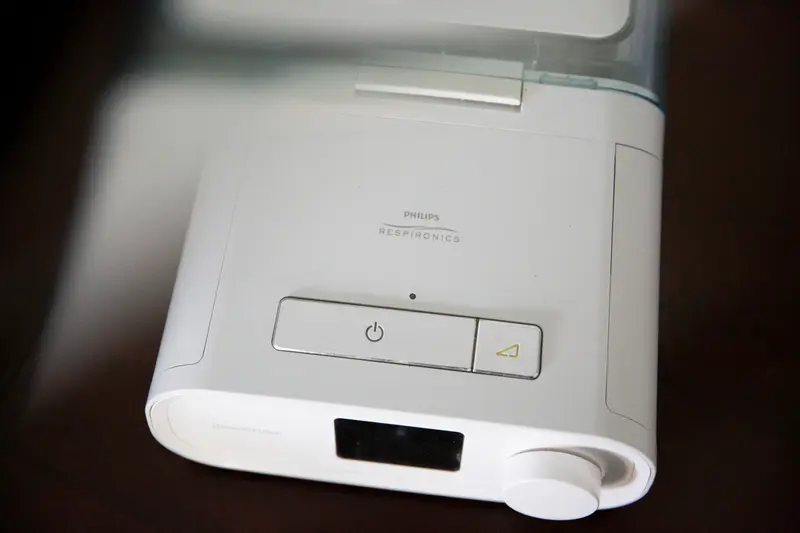Two prominent U.S. senators are calling for a government investigation into the Food and Drug Administration’s oversight of medical devices following revelations that the agency failed to protect the public from defective breathing machines capable of sending particles and fumes into the masks of patients.
Sens. Dick Durbin, D-Ill., and Richard Blumenthal, D-Conn., asked the Government Accountability Office — the investigative arm of Congress — to probe how the FDA tracks warnings about dangerous devices, oversees recalls and takes action against companies that put patients at risk.
Durbin chairs the Senate Judiciary Committee and Blumenthal, who also sits on the panel, heads an investigations subcommittee that reviews violations of laws and regulations impacting national health and safety.
The letter signed by the two lawmakers on Wednesday follows a yearlong investigation by ProPublica and the Pittsburgh Post-Gazette that detailed breakdowns by device maker Philips Respironics as well as the FDA in the years leading up to one of the largest and most disruptive recalls of its kind.
The news organizations found that the FDA had received hundreds of complaints about contamination inside Philips’ popular continuous positive airway pressure, or CPAP, machines and ventilators long before the June 2021 recall but took no action to alert doctors or patients. The complaints included at least 30 that described degradation of an industrial foam inside the machines that was found to break down and release potentially hazardous material.
“It now appears that FDA missed several opportunities to mitigate the harm done to the millions of patients who have used these recalled medical devices,” the senators wrote. “It is not clear whether or not FDA took action to inform hospitals, health care providers, and patients about the potential risks.”
The news organizations also found that Philips, with two sprawling factories outside Pittsburgh, held back thousands of additional foam complaints from the government, some dating back to 2010.
ProPublica and the Post-Gazette reported that Philips carried out multiple internal tests on the devices before the recall, including health hazard evaluations that found the foam could emit volatile organic compounds at dangerous levels.
“Even when Philips Respironics conducted an internal health hazard evaluation, which confirmed that inhaling the chemicals from the sound abatement foam could cause ‘permanent impairment,’ it did nothing, while patients suffered,” the senators wrote. “That is unacceptable.”
The senators asked the GAO to look at how the FDA ensures that medical device companies initiate recalls, what the agency does when manufacturers fail to comply and what resources or legislation would be needed to improve the agency’s oversight.
Durbin and Blumenthal said the inquiry would be a follow-up to a similar GAO study more than a decade ago that found the FDA often failed to review medical device recalls to determine if they protected the public.
“Given recent reporting and the dramatic increase in recalls since then, it is clear that GAO and Congress must examine FDA’s oversight of medical device recalls once again,” the senators wrote.
In the Philips case, the FDA said it acted as soon as it learned of the safety concerns in April 2021, just weeks before the recall.
The agency acknowledged that it received earlier reports from Philips, including complaints that detailed “general contamination issues,” but said the contamination could have been caused by external sources and not the problem foam. The FDA said it received 30 reports about the foam itself in the years before the recall but that those complaints did not indicate that any patients had been harmed.
Philips said it evaluated complaints about the foam on a case-by-case basis and launched the recall shortly after the company became aware of the potential significance of the problem. The company has also said that more recent testing shows that its machines are unlikely to cause “appreciable harm.”
Philips and its parent company “share the same objectives as the FDA,” the firm said.
In the aftermath of the news organizations’ first story in September, Blumenthal asked the Justice Department to take immediate enforcement action against Philips. He later expanded his call for aggressive enforcement in a letter to FDA Commissioner Robert M. Califf and Attorney General Merrick Garland.
Calling the findings by ProPublica and the Post-Gazette “explosive,” Blumenthal urged both leaders to “urgently use all of their authorities to protect current and future patients by investigating these allegations thoroughly, taking the strongest enforcement action possible, including criminal charges, if the allegations are substantiated.”
Michael Korsh of the Pittsburgh Post-Gazette contributed reporting.












